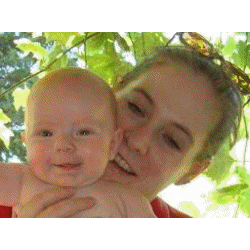World Breastfeeding Week starts on August 1, and runs through August 7th. The theme of this year is “Mother Support- Going for the Gold.”
Supporting a mother who is breastfeeding is so important. There are so many other demands that a new mother faces when nursing, having support can be invaluable to the mother and new baby to establish breastfeeding.
But did you know that nursing a baby past six months and has many health benefits for the baby and the mother? Sadly it seems that once a baby is nursed passed six months and beyond, support often turns to opposition?
Nursing mothers who continue to breastfeed past six months, a year, a year and a half, two years, three years, and even four years and beyond also need support. Likely they have heard negative comments about nursing their older child.
I am happy and proud to say that I nursed Ryan (my first son) until he was 26 months old. I wanted to nurse him longer but I was seven months pregnant with my second son, Cole, and my milk had gone, and it was incredibly irritating to me- pregnant hormones and all. I am still nursing Cole, mainly before nap time and bedtime, but he has shown no interest in weaning, and I don’t have any interest in forcing him to do so. In fact, it is a very nice bonding quiet time for us at the end of the day.
So many mothers who nurse a baby older than a year, feel like they have to hide it, and not talk about it. Sometimes mothers are made to feel like they are doing something wrong, or potentially stunting their child’s development, but that is not the case at all.
In honor of supporting breastfeeding mothers, who nurse their babies of all ages, I am posting one of my favorite pieces about breastfeeding, by Diane Wiessinger, MS and International Board Certified Lacatation Consultant (IBCLC). Perhaps you will learn something you didn’t know about breastfeeding, or maybe it will inspire you to support a breastfeeding mother to keep nursing a bit longer if she wishes to do so.
I think it would be great as a a society if we supported ALL nursing mothers, whether they were nursing a newborn, infant, toddler, pre-schooler, etc. It truly is one of the single best things a mother can do for her child, and that should be supported and celebrated.
What if I Want to Wean My Baby?
by Diane Wiessinger, MS, IBCLC
| Breastfeeding your baby for even a day is the best baby gift you can give. Breastfeeding is almost always the best choice for your baby. If it doesn’t seem like the best choice for you right now, these guidelines may help.IF YOU NURSE YOUR BABY FOR JUST A FEW DAYS, he will have received your colostrum, or early milk. By providing antibodies and the food his brand-new body expects, nursing gives your baby his first – and easiest – “immunization” and helps get his digestive system going smoothly. Breastfeeding is how your baby expects to start, and helps your own body recover from the birth. Why not use your time in the hospital to prepare your baby for life through the gift of nursing?IF YOU NURSE YOUR BABY FOR FOUR TO SIX WEEKS, you will have eased him through the most critical part of his infancy. Newborns who are not breastfed are much more likely to get sick or be hospitalized, and have many more digestive problems than breastfed babies. After 4 to 6 weeks, you’ll probably have worked through any early nursing concerns, too. Make a seriousgoal of nursing for a month, call La Leche League or a Lactation Consultant if you have any questions, and you’ll be in a better position to decide whether continued breastfeeding is for you.IF YOU NURSE YOUR BABY FOR 3 OR 4 MONTHS, her digestive system will have matured a great deal, and she will be much better able to tolerate the foreign substances in commercial formulas. If there is a family history of allergies, though, you will greatly reduce her risk by waiting a few more months before adding anything at allto her diet of breastmilk. And giving nothing but your milk for the first four months gives strong protection against ear infections for a whole year.IF YOU NURSE YOUR BABY FOR 6 MONTHS, she will be much less likely to suffer an allergic reaction to formula or other foods. At this point, her body is probably ready to tackle some other foods, whether or not you wean. Nursing for at least 6 months helps ensure better health throughout your baby’s first year of life, and reduces your own risk of breast cancer. Nursing for 6 months or more may greatly reduce your little one’s risk of ear infections and childhood cancers. And exclusive, frequent breastfeeding during the first 6 months, if your periods have not returned, provides 98% effective contraception.
IF YOU NURSE YOUR BABY FOR 9 MONTHS, you will have seen him through the fastest and most important brain and body development of his life on the food that was designed for him – your milk. You may even notice that he is more alert and more active than babies who did not have the benefit of their mother’s milk. Weaning may be fairly easy at this age… but then, so is nursing! If you want to avoid weaning this early, be sure you’ve been available to nurse for comfort as well as just for food. IF YOU NURSE YOUR BABY FOR A YEAR, you can avoid the expense and bother of formula. Her one-year-old body can probably handle most of the table foods your family enjoys. Many of the health benefits this year of nursing has given your child will last her whole life. She will have a stronger immune system, for instance, and will be much less likely to need orthodontia or speech therapy. The American Academy of Pediatrics recommends nursing for at least a year, to help ensure normal nutrition and health for your baby. IF YOU NURSE YOUR BABY FOR 18 MONTHS, you will have continued to provide your baby’s normal nutrition and protection against illness at a time when illness is common in other babies. Your baby is probably well started on table foods, too. He has had time to form a solid bond with you – a healthy starting point for his growing independence. And he is old enough that you and he can work together on the weaning process, at a pace that he can handle. A former U.S. Surgeon General said, “It is the lucky baby… that nurses to age two.” IF YOUR CHILD WEANS WHEN SHE IS READY, you can feel confident that you have met your baby’s physical and emotional needs in a very normal, healthy way. In cultures where there is no pressure to wean, children tend to nurse for at leasttwo years. The World Health Organization and UNICEF strongly encourage breastfeeding through toddlerhood: “Breastmilk is an important source of energy and protein, and helps to protect against disease during the child’s second year of life.”(1) Our biology seems geared to a weaning age of between 2 1/2 and 7 years(2), and it just makes sense to build our children’s bones from the milk that was designed to build them. Your milk provides antibodies and other protective substances as long as you continue nursing, and families of nursing toddlers often find that their medical bills are lower than their neighbors’ for years to come. Mothers who have nursed longterm have a still lower risk of developing breast cancer. Children who were nursed longterm tend to be very secure, and are less likely to suck their thumbs or carry a blanket. Nursing can help ease both of you through the tears, tantrums, and tumbles that come with early childhood, and helps ensure that any illnesses are milder and easier to deal with. It’s an all-purpose mothering tool you won’t want to be without! Don’t worry that your child will nurse forever. All children stop eventually, no matter what you do, and there are more nursing toddlers around than you might guess. Whether you nurse for a day or for several years, the decision to nurse your child is one you need never regret. And whenever weaning takes place, remember that it is a big step for both of you. If you choose to wean before your child is ready, be sure to do it gradually, and with love. 1.) Facts for Life: A Communication Challenge, published by UNICEF, WHO, and UNESCO, 1989 copyright ©1997 Diane Wiessinger, MS, IBCLC |



